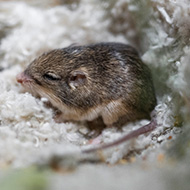'Pat' named Oldest Living Mouse

Pat the Pacific pocket mouse - Image (C) San Diego Zoo Wildlife Alliance.
An endangered mouse has received the title of Oldest Living Mouse in Human Care, verified by GUINNESS WORLD RECORDS.
Named Pat, the Pacific pocket mouse is currently nine years old, and has been raised by the San Diego Zoo Wildlife Alliance since birth.
Born on 14 July 2013, Pat was named after actor Sir Patrick Stewart, and was born in the organisation's first year of the Pacific pocket mouse conservation programme.
North America's smallest mouse species, Pacific pocket mice get their name from the pouches in their cheeks which are used to carry nesting materials and food. These creatures play a vital role in North America's ecosystem by dispersing seeds of native plants through their digging.
Dr Debra Shier, who established and oversees the Pacific pocket mouse conservation breeding programme, said: “This recognition is so special for our team, and is significant for the species.
“It’s indicative of the dedication and incredible care we as an organization provide for each species, from the largest to the very smallest.
“This acknowledgement is also a symbol of appreciation for species that people don’t know much about because they’re not charismatic megafauna, but are just as critical for ecosystem function. These overlooked species can often be found in our own backyards—like the Pacific pocket mouse.”



 The Federation of Independent Veterinary Practices (FIVP) has announced a third season of its podcast, Practice Matters.
The Federation of Independent Veterinary Practices (FIVP) has announced a third season of its podcast, Practice Matters.